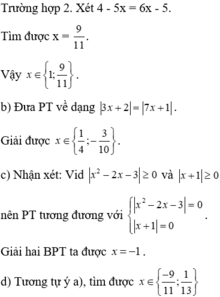Hãy nhập câu hỏi của bạn vào đây, nếu là tài khoản VIP, bạn sẽ được ưu tiên trả lời.

e) ĐK : \(\left\{{}\begin{matrix}1+3x\ne0\\1-3x\ne0\end{matrix}\right.\Leftrightarrow\left\{{}\begin{matrix}3x\ne-1\\3x\ne1\end{matrix}\right.\Leftrightarrow\left\{{}\begin{matrix}x\ne\dfrac{-1}{3}\\x\ne\dfrac{1}{3}\end{matrix}\right.\)
\(\Leftrightarrow\dfrac{12}{\left(1-3x\right)\left(1+3x\right)}=\dfrac{\left(1-3x\right)^2-\left(1+3x\right)^2}{\left(1+3x\right)\left(1-3x\right)}\)
\(\Leftrightarrow12\left(1+3x\right)\left(1-3x\right)=\left(1-3x\right)\left(1+3x\right)\left(1-3x-1-3x\right)\left(1-3x+1+3x\right)\)
\(\Leftrightarrow12=\left(-6x\right).2\Leftrightarrow6=-6x\)
\(\Leftrightarrow x=-1\left(TM\right)\)

\(1,A=\left(3x+7\right)\left(2x+3\right)-\left(2x+3\right)-\left(3x-5\right)\left(2x+11\right)\\ =6x^2+23x+21-2x-3-6x^2-23x+55\\ =73-2x\left(đề.sai\right)\\ B=x^4+x^3-x^2-2x^2-2x+2-x^4-x^3+3x^2+2x\\ =2\\ 2,\\ a,\Leftrightarrow30x^2+18x+3x-30x^2=7\\ \Leftrightarrow21x=7\Leftrightarrow x=\dfrac{1}{3}\\ b,\Leftrightarrow-63x^2+78x-15+63x^2+x-20=44\\ \Leftrightarrow79x=79\Leftrightarrow x=1\\ c,\Leftrightarrow\left(x+5\right)\left(x^2+3x+2\right)-x^3-8x^2=27\\ \Leftrightarrow x^3+3x^2+2x+5x^2+15x+10-x^3-8x^2=27\\ \Leftrightarrow17x=17\Leftrightarrow x=1\)
\(d,\Leftrightarrow7x-2x^2-3+x^2+x-6=-x^2-x+2\\ \Leftrightarrow9x=11\Leftrightarrow x=\dfrac{11}{9}\)

* 4x - 1 = 3x - 2
⇔ 4x - 3x = -2 + 1
⇔ x = -1
Vậy tập nghiệm của pt là S = {-1}
* \(\frac{3}{4}-3x=0\)
⇔ \(\frac{3}{4}-\frac{3x.4}{4}=0\)
⇒ 3 - 12x = 0
⇔ 12x = 3
⇔ x = \(\frac{3}{12}=\frac{1}{4}\)
Vậy tập nghiệm của pt là S = \(\left\{\frac{1}{4}\right\}\)
* 3x - 2 = 2x + 3
⇔ 3x - 2x = 3 + 2
⇔ x = 5
Vậy tập nghiệm của pt là S = {5}
* 2(x - 3) = 5(x + 4)
⇔ 2x - 6 = 5x + 20
⇔ 2x - 5x = 20 + 6
⇔ -3x = 26
⇔ x = \(\frac{-26}{3}\)
Vậy tập nghiệm của pt là S = \(\left\{\frac{-26}{3}\right\}\)
\(A,5x-25=0\)
\(\Leftrightarrow5x-5^2=0\)
\(\Leftrightarrow5\left(x-1\right)=0\)
\(\Leftrightarrow x-1=0\)
\(\Rightarrow x=1\)
Chúc bạn học tốt !

a: 5-3x=6x+7
=>-3x-6x=7-5
=>-9x=2
=>\(x=-\dfrac{2}{9}\)
b: \(\dfrac{3x-2}{6}-5=3-\dfrac{2\left(x+7\right)}{4}\)
=>\(\dfrac{3x-2}{6}+\dfrac{x+7}{2}=8\)
=>\(\dfrac{3x-2+3\left(x+7\right)}{6}=8\)
=>3x-2+3x+14=48
=>6x+12=48
=>6x=36
=>\(x=\dfrac{36}{6}=6\)
c: \(\left(x-1\right)\left(5x+3\right)=\left(3x-8\right)\left(x-1\right)\)
=>\(\left(x-1\right)\left(5x+3\right)-\left(3x-8\right)\left(x-1\right)=0\)
=>(x-1)(5x+3-3x+8)=0
=>(x-1)(2x+11)=0
=>\(\left[{}\begin{matrix}x-1=0\\2x+11=0\end{matrix}\right.\Leftrightarrow\left[{}\begin{matrix}x=1\\x=-\dfrac{11}{2}\end{matrix}\right.\)
d: \(\left(2x-1\right)^2-\left(x+3\right)^2=0\)
=>\(\left(2x-1-x-3\right)\left(2x-1+x+3\right)=0\)
=>\(\left(x-4\right)\left(3x+2\right)=0\)
=>\(\left[{}\begin{matrix}x-4=0\\3x+2=0\end{matrix}\right.\Leftrightarrow\left[{}\begin{matrix}x=4\\x=-\dfrac{2}{3}\end{matrix}\right.\)

20) -5-(x + 3) = 2 - 5x ⇔ -5 - x - 3 = 2 -5x ⇔ 4x = 10 ⇔ x = \(\frac{5}{2}\)
Vậy...

a) ĐKXĐ: \(x\notin\left\{-1;0\right\}\)
Ta có: \(\dfrac{x+3}{x+1}+\dfrac{x-2}{x}=2\)
\(\Leftrightarrow\dfrac{x\left(x+3\right)}{x\left(x+1\right)}+\dfrac{\left(x+1\right)\left(x-2\right)}{x\left(x+1\right)}=\dfrac{2x\left(x+1\right)}{x\left(x+1\right)}\)
Suy ra: \(x^2+3x+x^2-3x+2=2x^2+2x\)
\(\Leftrightarrow2x^2+2-2x^2-2x=0\)
\(\Leftrightarrow-2x+2=0\)
\(\Leftrightarrow-2x=-2\)
hay x=1(nhận)
Vậy: S={1}
b) ĐKXĐ: \(x\notin\left\{-7;\dfrac{3}{2}\right\}\)
Ta có: \(\dfrac{3x-2}{x+7}=\dfrac{6x+1}{2x-3}\)
\(\Leftrightarrow\left(3x-2\right)\left(2x-3\right)=\left(6x+1\right)\left(x+7\right)\)
\(\Leftrightarrow6x^2-9x-4x+6=6x^2+42x+x+7\)
\(\Leftrightarrow6x^2-13x+6-6x^2-43x-7=0\)
\(\Leftrightarrow-56x-1=0\)
\(\Leftrightarrow-56x=1\)
hay \(x=-\dfrac{1}{56}\)(nhận)
Vậy: \(S=\left\{-\dfrac{1}{56}\right\}\)
c) ĐKXĐ: \(x\ne-\dfrac{2}{3}\)
Ta có: \(\dfrac{5}{3x+2}=2x-1\)
\(\Leftrightarrow5=\left(3x+2\right)\left(2x-1\right)\)
\(\Leftrightarrow6x^2-3x+4x-2-5=0\)
\(\Leftrightarrow6x^2+x-7=0\)
\(\Leftrightarrow6x^2-6x+7x-7=0\)
\(\Leftrightarrow6x\left(x-1\right)+7\left(x-1\right)=0\)
\(\Leftrightarrow\left(x-1\right)\left(6x+7\right)=0\)
\(\Leftrightarrow\left[{}\begin{matrix}x-1=0\\6x+7=0\end{matrix}\right.\Leftrightarrow\left[{}\begin{matrix}x=1\\6x=-7\end{matrix}\right.\Leftrightarrow\left[{}\begin{matrix}x=1\left(nhận\right)\\x=-\dfrac{7}{6}\left(nhận\right)\end{matrix}\right.\)
Vậy: \(S=\left\{1;-\dfrac{7}{6}\right\}\)
d) ĐKXĐ: \(x\ne\dfrac{2}{7}\)
Ta có: \(\left(2x+3\right)\cdot\left(\dfrac{3x+8}{2-7x}+1\right)=\left(x-5\right)\left(\dfrac{3x+8}{2-7x}+1\right)\)
\(\Leftrightarrow\left(2x+3\right)\cdot\left(\dfrac{3x+8+2-7x}{2-7x}\right)-\left(x-5\right)\left(\dfrac{3x+8+2-7x}{2-7x}\right)=0\)
\(\Leftrightarrow\left(2x+3-x+5\right)\cdot\dfrac{-4x+6}{2-7x}=0\)
\(\Leftrightarrow\left(x+8\right)\cdot\left(-4x+6\right)=0\)(Vì \(2-7x\ne0\forall x\) thỏa mãn ĐKXĐ)
\(\Leftrightarrow\left[{}\begin{matrix}x+8=0\\-4x+6=0\end{matrix}\right.\Leftrightarrow\left[{}\begin{matrix}x=-8\\-4x=-6\end{matrix}\right.\Leftrightarrow\left[{}\begin{matrix}x=-8\left(nhận\right)\\x=\dfrac{3}{2}\left(nhận\right)\end{matrix}\right.\)
Vậy: \(S=\left\{-8;\dfrac{3}{2}\right\}\)